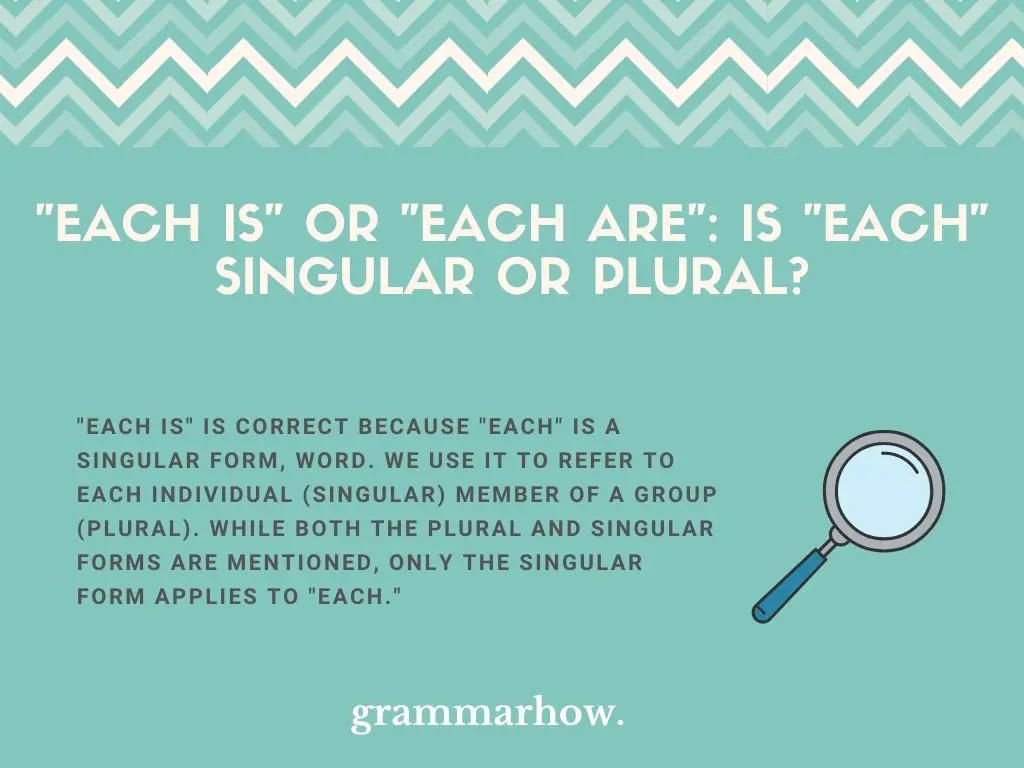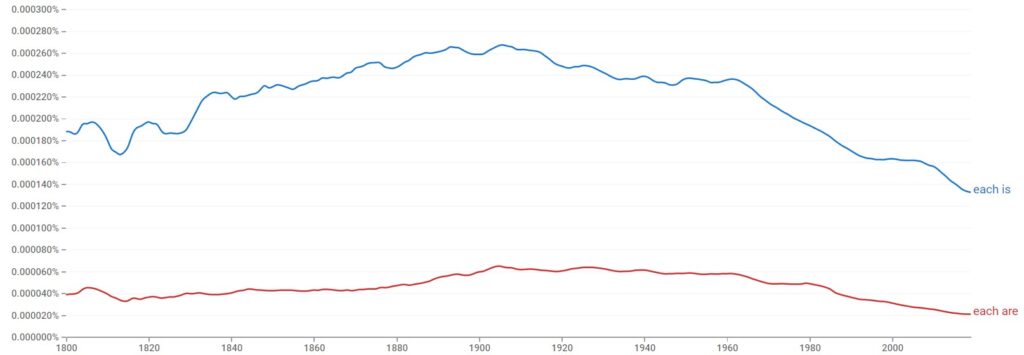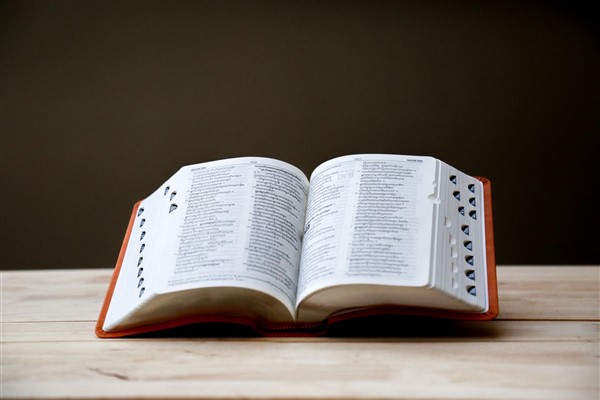-
EM
-
Articles
-
Usage
-
Agreement
Summary
Each, which refers to every person or thing individually, is grammatically singular. Use each before a singular noun followed by a singular verb.
Examples
- Each person is important.
- Each story is based on real events.
When used alone as a pronoun, each is again singular.
Example
- Each is based on real events.
Each may appear after a plural noun and be part of a plural subject in a sentence. It is then followed by a plural verb.
Example
- The fans each have a valid ticket.
“Each of” is generally followed by a singular verb in formal, edited prose.
Examples
- Each of the fans has a ticket.
- Each of these is valid.
In informal usage and speech, plural verbs are often used instead. (While common in speech, avoid treating each as plural in formal texts.)
Example
Each of those are ‘unforgettable sounds of the nation’s history,’ the Library of Congress said on Wednesday.
— “F.D.R. Speeches and Alicia Keys Album Added to National Recording Registry,” New York Times (Apr. 16, 2022)
In an indefinite reference, each, although singular, may be followed by a plural, gender-neutral pronoun.
Example
- Each participant gets their own kit.
Finally, when referring to a collective noun, each is sometimes used with plural verbs to refer to an entire group. This is seen more often in British than in American usage.
Example
Each team have been doing their best behind the scenes to destabilise their rivals.
— “Dutch Grand Prix,” BBC Sport (Sep. 4, 2021)
How is each used?
The word each, which refers to every person or thing in a group separately, can be used as a determiner, a pronoun, or an adverb. It can appear before a noun, in place of a noun, after a noun, or after an amount.
Examples
- Determiner: Each story is written by a different author.
- Pronoun: The stories are all connected, although each is written by a different author.
- Pronoun: The stories each have the same characters.
- Pronoun: Each of the stories is written by a different author.
- Adverb: These books cost six dollars each.
In this article, we discuss whether to use singular or plural verbs and pronouns with each.
Each before a noun
Use each as a determiner before a singular countable noun to refer to every one of two or more people or things individually. Make sure that the verb that follows is also singular. (A determiner is a word that appears before a noun and qualifies its reference.)
Examples
- Each box is empty.
- Each problem has a solution.
- Each kit comes with a set of instructions.
- Each house is more expensive than the last.
- Each book costs a dollar.
- Each child deserves a good education.
As a determiner, each cannot be followed by plural nouns or verbs.
Example
- Incorrect: Each boxes are empty.
Correct: Each box is empty.
Each may also be followed by the pronoun one for emphasis.
Examples
- Each one is more expensive than the last.
- Each one is correct.
- Each one is empty.
When each is followed by a collective noun, which refers to an entire group, it is generally followed by singular verbs in American usage but plural verbs in British usage. (Collective nouns are often treated as plural in British usage.)
Examples
- American:
Each team has at least one critical flaw.
— “The Reason Every NFL Playoff Team Will Lose,” New York Times (Jan. 12, 2022)
- British:
Each team have a low, wide goal on one end of the field.
Each with their
Each may be followed by a gender-neutral plural pronoun (their, them) when referring to an unknown person.
Examples
- Each employee has their own ID card that grants them access to the thirteenth floor.
Seen more often than “Each employee has his or her own ID card.”
- Each person has their own story.
- Each citizen must exercise their right to vote this year.
Tip
Indefinite pronouns like each and someone are often followed by third-person plural pronouns (they, them, their) to refer to unknown persons.
Each as a standalone pronoun
Each may stand by itself as a pronoun that refers to a noun. It is then followed by a singular verb.
Examples
- I checked all the boxes: each is empty and can go into storage.
Each used as a singular pronoun followed by a singular verb to refer to every box separately.
- Each comes in its own package.
- Listen to them: each has a story to tell you.
Each after a subject
The pronoun each may appear after a plural subject. It is then followed by plural verbs and pronouns that agree with the plural subject.
Examples
- The employees each have an ID card.
The pronoun each refers to the employees individually but is followed by a plural verb (“have”), which agrees with the plural subject (“the employees”) of the sentence.
- We each have our own plans.
- Lulu and I each get a chance.
- Maya and Anita each have a ticket.
- They each have an opinion.
Each of
In general, use a singular verb with each when it is followed by of and a plural noun phrase (“Each of . . .”). The subject of such a clause is the word each, which is singular, and the grammatically correct verb to use with it is singular rather than plural.
Examples
- Each of the students is brilliant.
- Each of us was right.
- Each of them is ready.
- Each of the cats likes pizza.
- Each of her friends has been invited.
In spoken English and other informal usage, however, notional agreement often trumps grammatical agreement. Thus, a speaker or writer referring to an entire group (with multiple people or things) may use a plural verb after “each of.”
Examples
Each of those are coordinated from developing the basic science.
— “Donald Wyse Is Growing a New Future for Farming,” New York Times (May 3, 2022)
But there’s a lot of conflicting information regarding how healthy each of them are.
— “Which Cooking Oil Is the Healthiest?” BBC Future (Sep. 4, 2020)
Such usage is quite common and generally acceptable in speech and informal usage. Merriam-Webster’s Dictionary of English Usage, for example, notes that “each of” may be considered plural. In informal usage, “each of” is often followed by plural verbs.
Example
As you turn each page, you enter another story, but each of the stories are connected.
— William Dickerson, Goodreads review (Mar. 11, 2014)
Also, when referring to collective nouns (like team or group), “each of” may be followed by a plural instead of singular verb. This is seen more often in British than in American usage and in spoken English rather than edited text.
Example
Dealing with equivalents is dangerous as each of the teams have a different makeup.
— “Red Bull’s Christian Horner Defends Team’s Decision to Leave Fota,” Guardian (Dec. 10, 2011)
Note
“Each of” is generally treated as singular in formal, edited prose.
When each is followed by a relative clause starting with who, that, or which, check what is being described: the entire group or the individuals in the group.
Examples
- Each of the students that have passed the exam is being given an award.
Who has passed the exam? The students
have
. Who is being given an award? Each of them
is
.
- Each of the cats that like pizza also likes cheese.
- Each of my friends who live in the city has been invited.
Examples from published content
The following examples from literature show how each is used before a singular noun followed by a singular verb.
Examples
Each organic being is striving to increase in a geometrical ratio.
Each deed you do, each act, binds you to itself and to its consequences.
Each can also be used alone as a pronoun followed by a singular verb.
Example
Each has inspired a few good quotes in its day.
— Margaret Atwood, “The Loneliness of the Military Historian,” Morning in the Burned House (1995)
In contrast, in these examples, each follows a plural noun phrase, is part of a plural subject, and is therefore followed by a plural verb.
Examples
We each have our circle.
— Gertrude Stein, “A Circular Play,” Last Operas and Plays (1949)
The various ethnic and political factions at the station each want to present their own truth.
— Marc Fisher, “Voice of the Cabal,” New Yorker (Dec. 4, 2006)
Finally, “each of” is generally considered singular in edited prose but may be treated as plural when the speaker wants to emphasize a plural reference, as seen in the following examples.
Examples
Each of these exclamations was a shriek.
Each of you has a comrade to sympathise with him in his decay.
Now you might think that each of those are reasonable points which turn out, when you poke a bit, not to be in conflict at all.
Ian Hacking, “Phony Peace,” Economist (Oct. 14, 1994)
To drill down a little bit further, each of them are former players.
— Isaac Chotiner, “Jalen Rose on the N.B.A. Playoffs,” New Yorker (July 1, 2021)
but
Usage guide
Use each with singular verbs, except when it follows a plural noun (“Each person is different,” “Each of us is happy,” but “We each are happy”). Each may also be used with a plural verb to refer to multiple instead of individual people or things (“Each of those are important”), although singular verbs are preferred in formal usage. Each is generally used with singular pronouns (“Each story has an ending”) but may be used with a plural pronouns to refer to unknown persons (“Each applicant must verify their details”).
The word “each” comes with interesting quantifiable rules. It is technically a plural word since it refers to a group, but it doesn’t follow standard plural rules. This article will explain whether “each is” or “each are” is more appropriate.
“Each Is” Or “Each Are”: Is “Each” Singular Or Plural?
“Each is” is correct because “each” is a singular form, word. We use it to refer to each individual (singular) member of a group (plural). While both the plural and singular forms are mentioned, only the singular form applies to “each.”
Some writers believe that “each are” is correct, but this is not the case. There are no places where “each are” makes grammatical sense, and we should not be tempted to use it in our writing.
Remember, we split a group into individual parts whenever we use “each.” This means that we’re referring to each member or thing on a singular level, making “is” the only correct verb.
Examples Of How To Use “Each Is” In A Sentence
So, now that we’ve seen which is the correct verb to accompany “each,” it’s time to look into how it works. We’ll include some examples to show you exactly what you can expect from the verb form.
- Each of you is going to have to deliver a powerful presentation on this topic.
- Each of them is making sure that we can get to the other side.
- Each of them is important, and I tell them that all the time.
- Each of us is in need of something new before it’s too late.
- Each of his children is helpful, which is more than can be said about him.
- Each of the teachers is making sure that their students are in the best educational system.
- Each of us is going through something worse than the rest (if that’s even possible!)
“Each is” is a phrase we can use with pronouns like “you,” “they,” or “us” to establish groups. We can also specify the group or number of people if we want to. “Each” is always a singular word to refer to everyone individually within the group rather than the group as a whole.
How Prevalent Is The Use Of “Each Is” And “Each Are”?
We also have some statistics to share with you about the popularity of the phrases. We’ve already mentioned that “each are” is incorrect, but it’s still a surprisingly common mistake for some writers to make.
According to Google Ngram Viewer, “each is” is the most popular choice because it’s the only correct one. However, you can see that “each are” is also sometimes used, even though it is an incorrect form. You should avoid using it yourself.
Is It “Each Of Them Is” Or “Each Of Them Are”?
The phrase “each is” isn’t all that common. We usually have to add a pronoun or group between “each” and “is” to demonstrate what we’re talking about.
“Each of them is” is the only correct form. We use it to show that every individual in the group “them” is doing something.
- Correct: Each of them is here to stay.
- Incorrect: Each of them are here to help.
Is It “Does Each Of Us” Or “Do Each Of Us”?
“Do each of us” is correct because “do” applies to singular form words. We cannot use “does each of us” because “does” is the plural word, which is never right.
- Correct: Do each of us have to be here?
- Incorrect: Does each of us matter?
Is It “Each Of Them Has” Or “Each Of Them Have”?
“Each of them has” is correct because “has” works in the singular form. We use it to split the group apart, which is what “each” attempts to do. “Each of them have” is incorrect.
- Correct: Each of them has a story to tell.
- Incorrect: Each of them have each other.
Is It “Each Of Us Is” Or “Each Of Us Are”?
“Each of us is” is correct because we’re using “each” in the singular to split up the group “us.” The same rules apply, meaning only the singular verb “is” works.
- Correct: Each of us is going to report you.
- Incorrect: Each of us are making sure we’re okay.
You may also like: Each of Us vs. Each One of Us vs. Each and Every One of Us
Is It “Each Of This” Or “Each Of These”?
“Each of these” is correct because we haven’t yet established the group in the context. We use “these” to refer to the plural group, while “each” is the singular word that splits it up. “This” is also singular, which does not work with the singular “each” because a group is not formed.
- Correct: Each of these people is happy to help out.
- Incorrect: Each of this thing is here for you.
You may also like:
“Each Was” or “Each Were” – Correct Version (With Examples)
“Each Has” or “Each Have” – Correct Version (With Examples)
“Each And Every One Of You”: Singular Or Plural? (Is vs. Are Revealed)
Martin holds a Master’s degree in Finance and International Business. He has six years of experience in professional communication with clients, executives, and colleagues. Furthermore, he has teaching experience from Aarhus University. Martin has been featured as an expert in communication and teaching on Forbes and Shopify. Read more about Martin here.
Have a discussion about this article with the community:
-
If you cant use thier with each because each is singular…. Then how does us work.with each?
LikeReply1 year ago
-
Billy Wilson
LikeReply 13 years ago
-
Billy Wilson
Each of the citizens were voting today. (Is «were» correct or should we use singular «was»)?
LikeReply3 years ago
-
Each…was. But, consider: Each of the citizens voted today.
LikeReply2 years ago
-
-
Michelle Camp Rowland
Each wants a chance to earn money. Is the verb correct in this sentence?
LikeReply 13 years ago
-
Joel Alderman
Sorry. The letter «a» sneaked into my post, ahead of «the wrong word to use.» It was just a typo.
—Joel Alderman again
LikeReply6 years ago
-
Joel Alderman
In these examples, «each» is a the wrong word to use. This whole issue could be avoided by simply using «both» instead of «each,» followed by the plural verb.
-Joel Alderman, Milford, Connecticut
LikeReply 36 years ago
-
Dora du Plessis
Thank you, I was just wondering about «Each of these approaches has/have advantages and disadvantages» and when changing to ‘both’ the plural verb makes sense.
LikeReply4 years ago
-
-
Matthew Fragner
In this example, each is an adjective modifying «We», so the verb remains dictated by the subject «We». We each are happy. We are each happy. Each of us is happy. Happy?
LikeReply6 years ago
-
Dorothy Witham Valdez
I was taught that each (each and everyon of us) always take a singular verb. if we begin a sentence with «We, each, has/have a responsibility, etc. which is correct
LikeReply6 years ago
-
Briley Payton
LikeReply7 years ago
Citation
Use the citation below to add this article to your bibliography:
Indefinite Pronouns
Each is an indefinite pronoun. Indefinite pronouns are uncountable, and in that way they’re different from most other pronouns. With the pronoun they, you know that a concrete number of people are being referenced. The pronoun I refers to one person. Nobody, on the other hand, can’t be counted. Anybody proves just as challenging to count. Indefinite pronouns are most often singular.
Examples:
Each is correct.
Each of the students is correct.
Each one is correct.
Other singular indefinite pronouns include:
- anyone
- anybody
- either
- everybody
- everyone
- neither
- nobody
- no one
- someone
- somebody
- one
Some pronouns are always plural, even when they’re followed by a prepositional phrase. Here’s a list of plural indefinite pronouns:
- both
- few
- many
- others
- several
Now, hardest of all, some pronouns can be either singular or plural depending on usage:
- all
- any
- more
- most
- some
Take the word all. Below, you can see that all can be used with a singular verb or a plural verb.
- All of us are coming.
- All of the icing is gone.
In order to determine whether all requires a singular or plural verb, you’ll need to look at the actual usage. For instance, if the indefinite pronoun is followed by a prepositional phrase, ask yourself whether the object of the prepositional phrase is plural or singular.
In the following sentences, we’ve highlighted the object of the prepositional phrase.
- All of us are coming.
- All of the icing is gone.
If a prepositional phrase ends with a plural noun, you should use a plural verb form, but only when it follows one of these indefinite pronouns—all, any, more, most, or some.
The word each should never be paired with the plural form of a verb. It’s always singular.
Collective Nouns
Collective nouns—like staff, group, or team—consist of individual members that make up a single collective unit. In the United States, we treat most collective nouns as singular nouns. British English handles these words differently. For the most part, Americans treat collective nouns as a single unit.
Keep an eye out for situations in which the emphasis is on the individual members, rather than the group.
For example:
- The pack of floss is in the bathroom.
- The pack of dogs are fighting over the food.
In the second sentence, the fighting occurs between multiple dogs in the pack, so we would consider “the pack of dogs” a plural subject.
You could just as easily say:
The pack of dogs is moving north.
In this context, the dogs are acting together as a single unit, so a singular verb form is appropriate.
Here are a few examples of collective nouns:
- audience
- class
- crowd
- family
- flock
- committee
- corporation
- group
- panel
- staff
Review
- _Each/Both_ sings well.
- Each corporation _files/file_ for bankruptcy.
- Each family _celebrates/celebrate_ the holiday differently.
- _Some / Each_ of us likes football.
Answers: 1. Each 2. Files 3. Celebates 4. Each
Sources:
- https://examples.yourdictionary.com/examples-of-indefinite-pronouns.html
- https://sites.utexas.edu/legalwriting/2017/06/05/collective-nouns-singular-or-plural/
- https://www.dictionary.com/e/collective-nouns/

Kari Lisa Johnson
I’m an award-winning playwright with a penchant for wordplay. After earning a perfect score on the Writing SAT, I worked my way through Brown University by moonlighting as a Kaplan Test Prep tutor. I received a BA with honors in Literary Arts (Playwriting)—which gave me the opportunity to study under Pulitzer Prize-winner Paula Vogel. In my previous roles as new media producer with Rosetta Stone, director of marketing for global ventures with The Juilliard School, and vice president of digital strategy with Up & Coming Media, I helped develop the voice for international brands. From my home office in Maui, Hawaii, I currently work on freelance and ghostwriting projects.
You goes with are. Does the presence of each change this?
How satisfied are each of you with the time you’ve spent in your respective universities.
How satisfied is each of you with the time you’ve spent in your respective universities
asked Apr 2, 2020 at 6:16
1
- Under the traditional rule, the indefinite pronoun each is always singular and takes a singular verb.
Thus:
«Each of the golfers wants to win the PGA. Each of us wishes for success»
- Pronouns Referring Back to “Each”
When the pronoun each is referred to by another pronoun, that other pronoun must appear in the singular.
Thus:
Each of the NFL players wants to increase his bonus. We must recognize that each has identified his or her own priorities.
answered Apr 2, 2020 at 6:43
Your question is perfectly answered by the following reply by V.V. on the English language learners stack exchange to a very similar question; here are the pertinent parts:
«Each refers to every one of two or more people or things. […] It is followed by the verb in the singular. […]
Each of the answers is worth five points, but the answers are worth five points each.»
This is the stack exchange question containing the original response by V.V.
https://ell.stackexchange.com/questions/83127/each-of-them-is-or-each-of-them-are
answered Apr 2, 2020 at 6:57
NoahNoah
3782 silver badges12 bronze badges















